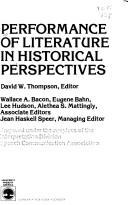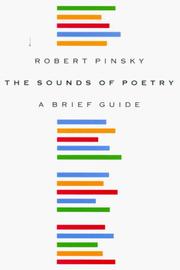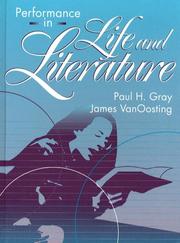| Listing 1 - 10 of 372 | << page >> |
Sort by
|
Book
Abstract | Keywords | Export | Availability | Bookmark
 Loading...
Loading...Choose an application
- Reference Manager
- EndNote
- RefWorks (Direct export to RefWorks)
Book
ISBN: 0672612267 Year: 1975 Publisher: Indianapolis (Ind.): Bobbs-Merrill
Abstract | Keywords | Export | Availability | Bookmark
 Loading...
Loading...Choose an application
- Reference Manager
- EndNote
- RefWorks (Direct export to RefWorks)
Book
ISBN: 0757545408 9780757545405 Year: 2007 Publisher: Dubuque, Iowa Kendall/Hunt
Abstract | Keywords | Export | Availability | Bookmark
 Loading...
Loading...Choose an application
- Reference Manager
- EndNote
- RefWorks (Direct export to RefWorks)

ISBN: 0819131474 Year: 1983 Publisher: Lanham (Md.) : University press of America,
Abstract | Keywords | Export | Availability | Bookmark
 Loading...
Loading...Choose an application
- Reference Manager
- EndNote
- RefWorks (Direct export to RefWorks)

ISBN: 0374266956 Year: 1998 Publisher: New York (N.Y.) : Farrar, Straus and Giroux,
Abstract | Keywords | Export | Availability | Bookmark
 Loading...
Loading...Choose an application
- Reference Manager
- EndNote
- RefWorks (Direct export to RefWorks)
Book
ISBN: 9781946160782 1946160784 Year: 2021 Publisher: Lafayette University of Louisiana at Lafayette Press
Abstract | Keywords | Export | Availability | Bookmark
 Loading...
Loading...Choose an application
- Reference Manager
- EndNote
- RefWorks (Direct export to RefWorks)
"Today, public readings have become a vital part of any form of literary life. Orality is the keyword of contemporary writing. Yet do we know what actually happen when a poetic text is read out loud? How are signs on a page transformed into a stage performance? What does it mean to move from a text for the eye to sounds and images presented in front of a living and actively participating audience? This book does answer these questions, but not in abstract or general terms .It looks instead at how authors themselves live this experience of reading out loud and how they write about it in their fiction (for the scene of a poet taking to floor in order to read her or his work to various kinds of audiences is a scene that frequently occurs in modern fiction). Taking its departure from Balzac, whose Lost Illusions contain the Ur-version of the public poetry reading, this books revisits a wide range of masterpieces of 19th and 20th Century literature, including works by Marcel Proust (Remembrance of Things Past) and James Joyce (The Dead), and then reaches out to contemporary practices, in literature as well as in cinema and the graphic novel. This book also contains a series of close readings of contemporary artists (poets, performers, directors, comics authors) who try to invent new forms of public reading that do not reject the written and visual aspects of their texts in order to strike the right balance between classic print culture and new orality"--
Book
ISBN: 9781609380793 Year: 2012 Publisher: Iowa City University of Iowa Press
Abstract | Keywords | Export | Availability | Bookmark
 Loading...
Loading...Choose an application
- Reference Manager
- EndNote
- RefWorks (Direct export to RefWorks)
Book

ISBN: 9782350183671 235018367X Year: 2015 Publisher: Nantes Nouvelles Cécile Defaut
Abstract | Keywords | Export | Availability | Bookmark
 Loading...
Loading...Choose an application
- Reference Manager
- EndNote
- RefWorks (Direct export to RefWorks)
Depuis les années soixante-dix, on assiste à un développement sans précédent des lectures publiques de la poésie écrite, en France. Il en résulte une revalorisation de l’oralité dans l’ensemble du champ littéraire contemporain. Or il s’avère que ce phénomène n’a encore été qu’assez peu interrogé dans le domaine universitaire français : ce volume s’attache à combler cette lacune. Si la lecture publique a souvent été considérée comme une simple oralisation de l’écrit, sans propriétés esthétiques spécifiques, il apparaît au contraire qu’il s’agit, dans le meilleur des cas, d’un « mode original particulier / autonome / d’existence de la poésie », comme l’a dit le poète Jacques Roubaud. Ce livre, centré sur le XXe siècle, aborde néanmoins l’histoire de la lecture publique de poésie depuis la fin du XIXe siècle. Cette pratique y est envisagée selon différents plans : la description et l’évolution des styles de diction, dans leur rapport à des questions de poétique ; l’identification des « diseurs », du public, et des lieux de lecture ; l’analyse des mutations médiologiques qui affectent nécessairement les modes de lecture et de réception. On ambitionne ainsi de décrire le moment où nous en sommes, dans lequel les tentatives orales des poètes sont autant de signes de vitalité.
Book
ISBN: 1805110063 1805110047 Year: 2023 Publisher: Cambridge, UK : Open Book Publishers,
Abstract | Keywords | Export | Availability | Bookmark
 Loading...
Loading...Choose an application
- Reference Manager
- EndNote
- RefWorks (Direct export to RefWorks)
"The book uncovers the versatility and literary skills of oral narrators in a small African island. Relying on the researches of three French ethnographers who interviewed storytellers in the 1970s-80s, Lee Haring shows a once-colonised people using verbal art to preserve ancient values in the postcolonial world, when the island of Mayotte was transforming itself from a neglected colony to an overseas department of France. The author's innovation is to read ethnographic researches as play scripts--to see printed folktales as accounts of live performances. One storyteller after another comments symbolically on what it is like to be a formerly colonised population. Storytelling women, in particular, combine diverse plots and characters to create traditional-sounding stories, which could not have been predicted from the African, Malagasy, Indian, and European traditions coexisting in Mayotte. Haring's account shows them to be particularly skilled at irony and ambiguity, conveying both submissive and rebellious attitudes in their tales. He makes Mayotte storytelling accessible to a new, English-speaking audience and demonstrates that traditional storytellers in those years were preserving, but also critiquing, their inherited social order in a changing world. Their creative intentions, cultural influences and widely different narrative styles constitute Mayotte's system of the arts of the word. Literary specialists, folklore enthusiasts, and people who like reading stories will find much to appreciate in this engaging and sophisticated book."--Publisher's website.

ISBN: 0205140459 Year: 1996 Publisher: Boston (Mass.) : Allyn and Bacon,
Abstract | Keywords | Export | Availability | Bookmark
 Loading...
Loading...Choose an application
- Reference Manager
- EndNote
- RefWorks (Direct export to RefWorks)
Lerarenopleiding --- Oral interpretation. --- (vak)didactiek talen.
| Listing 1 - 10 of 372 | << page >> |
Sort by
|

 Search
Search Feedback
Feedback About UniCat
About UniCat  Help
Help News
News